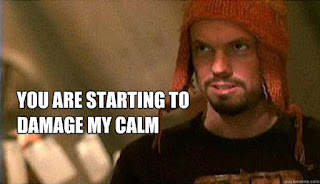Book cover
[Picture Credit: waterstones.com]
Now, I'm not usually one for war stories. They depress me and often leave me with a sense that poetic justice was not achieved for those who really fought in the battles and suffered so greatly. However, I had heard that Corelli was largely a love story, so I gave it a go. I'm really glad I did.
I'm not sure I can succinctly sum up the plot without leaving incredible, unforgiving gaps, but I'll attempt. The book begins just at the beginnings of Greece's involvement World War Two. We meet Dr Iannis and his daughter Pelagia, who live in Kefalonia, as well as a rich supporting cast of Kefalonian side characters: Lemoni, a little girl often found running wild, Farther Arsenios, a rotund, oft drunk priest, Velisarious, possibly the strongest man in all of Kefalonia and Alekos the solitary goat herder to name a few. Just reducing these characters to names and generalized characteristics seems limp, as most have very vital roles, however small, to play in the upcoming narrative over the years. Corelli, a good-humoured Italian officer is posted to the island of Kefalonia in 1941, as part of the occupying forces. As you may have guessed from the title, he is rather excellent on the mandolin. We follow the lives of Corelli, Pelagia, world leaders, German occupiers, communist rebels, mothers, soldiers and even priests over the course of the war, the aftermath and then the devastating earthquake of 1953 that flattened 90% of the island. The latter end of the novel takes us right into the 1990's, which gives a satisfying edge to the conclusion, as we follow those main characters (who live) right to the end. Yes, as a pre-warning there is lots of death in this book. Every death is heartbreaking, but this is usually a common theme in war novels.
Kefalonia island to the left of the Greek mainland
[Picture Credit: mapsofworld.com]
I found that with Corelli, the interweaving of the multiple voices and characters was done so well, it presented breaks in the war narrative, and made the whole experience very human. The war cannot help but be a central plot theme. However war is always experienced differently by different people and Bernieres does an incredible job of making the war seem far off and nothing to be worried about for some characters, a play thing for some and mentally and physically life changing for those experiencing it directly on the battlefields. There's humour - not something I thought I'd find in a classic love/war tale. I laughed out loud in places, which doesn't happen often. What I liked about the characters is that many of them experienced much development. The author does not forget that even minor characters in novels must undergo some personality overhauls, especially as a consequence of war. In fact I think my feelings for the whole of this novel might be similar to those in Gone with the Wind - a novel that has war as a constant, but the human stories around the war make the novel manageable, and not reduced to list of death figures, names of battlefields and models of army machinery.
Perhaps it was because I was in Kefalonia at the time of reading, but I adored this book. I learnt about events of World War Two that before I was ignorant of, and being in Kefalonia, seeing the cities, the nature, the earthquake museum, made it really vivid for me to read. It made me laugh and cry. My top three favourite characters were Lemoni, Carlo and Drousoula, as well as a special mention to Psipsina the 'greek cat' (actually a pine marten) *SPOILERS* who's death saddened me in a similar way to the death of Hedwig in Harry Potter, in that it was abrupt and unexpected and only briefly mentioned. *SPOILERS END*. 10/10 from me, and I will be watching the film later tonight, although a brief look at online reviews have left me slightly wary that Nicholas Cage might not quite do Corelli justice. We shall see.
"Please, Iatre, I've found a funny kind of cat." Lemoni to Dr Iannis
[Picture Credit: wikipedia.com]
If you're off on your travels, I would recommend seeking out a novel set in your chosen location. Especially excellent would be a novel based on the history of your chosen county, as it's an interesting way of learning more about other cultures and you'll probably appreciate your holiday more. Also it's an excellent way of killing time whilst waiting for flights or getting your tan on! This has been very lengthy, and I'm not sure I've actually said much. But Corelli was a stunning novel and I really would urge anyone to read it.
Over and out.



































